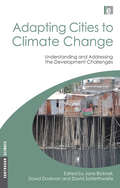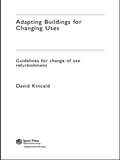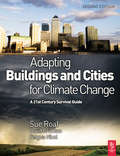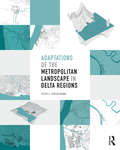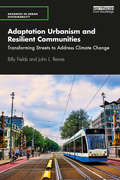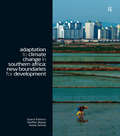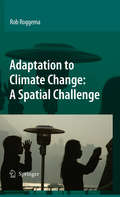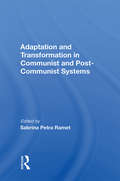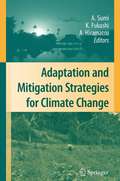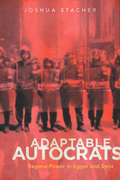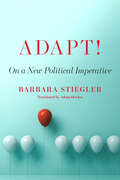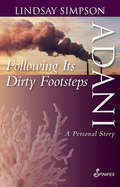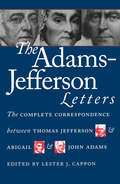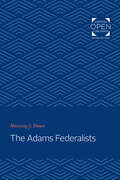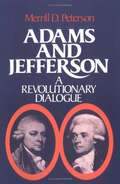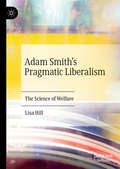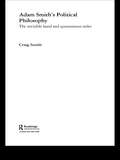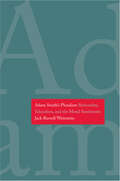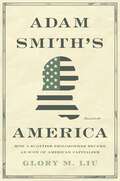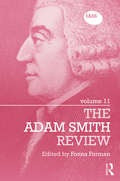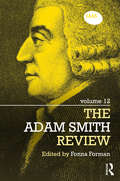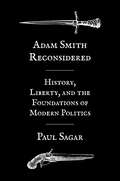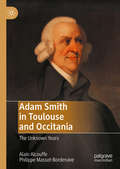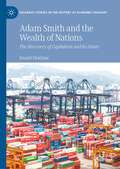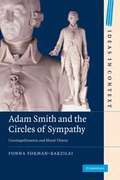- Table View
- List View
Adapting Cities to Climate Change: Understanding and Addressing the Development Challenges (Earthscan Climate Ser.)
by Jane Bicknell David Dodman David SatterthwaiteThis volume brings together, for the first time, a wide-ranging and detailed body of information identifying and assessing risk, vulnerability and adaptation to climate change in urban centres in low- and middle-income countries. Framed by an overview of the main possibilities and constraints for adaptation, the contributors examine the implications of climate change for cities in Africa, Asia and Latin America, and propose innovative agendas for adaptation. The book should be of interest to policy makers, practitioners and academics who face the challenge of addressing climate change vulnerability and adaptation in urban centres throughout the global South. Published with E&U and International Institute for Environment and Development
Adapting Buildings for Changing Uses: Guidelines for Change of Use Refurbishment
by David KincaidAdapting Building for Changing Uses discusses the comprehensive refurbishment of buildings to enable them to be used for purposes different to those originally intended.For those involved in the often risky business of conversion of buildings from one type of use to another, Adapting Building for Changing Uses provides secure guidance on which uses may be best suited to a particular location. This guidance is based on a unique decision tool, the "Use Comparator", which was developed through research carried out at UCL in the mid 1990's. The "Use Comparator" compares the physical and locational characteristics of a building with the characteristics best suited to various types of use. A total of 77 targeted types of use are evaluated, in contrast to the 17 uses normally considers by regulatory planners.Adapting Building for Changing Uses also identifies the key problems experienced by building managers involved in assembling the coalition of Producers, Investors, Marketeers, Regulators and Users, which makes the key decisions in "Adaptive Reuse". The book explores the differing perceptions and attitudes of these key decision agents to matters such as cost, value, risk and robustness, and offers advice on how to avoid the potential for project failure that these differences present.
Adapting Buildings and Cities for Climate Change: A 21st Century Survival Guide
by David Crichton Fergus Nicol Sue RoafFrom the bestselling author of Ecohouse, this fully revised edition of Adapting Buildings and Cities for Climate Change provides unique insights into how we can protect our buildings, cities, infra-structures and lifestyles against risks associated with extreme weather and related social, economic and energy events. Three new chapters present evidence of escalating rates of environmental change. The authors explore the growing urgency for mitigation and adaptation responses that deal with the resulting challenges. Theoretical information sits alongside practical design guidelines, so architects, designers and planners can not only see clearly what problems they face, but also find the solutions they need, in order to respond to power and water supply needs. Considers use of materials, structures, site issues and planning in order to provide design solutions. Examines recent climate events in the US and UK and looks at how architecture was successful or not in preventing building damage. Adapting Buildings and Cities for Climate Change is an essential source, not just for architects, engineers and planners facing the challenges of designing our building for a changing climate, but also for everyone involved in their production and use.
Adaptations of the Metropolitan Landscape in Delta Regions
by Peter C BosselmannAdaptations of the Metropolitan Landscape in Delta Regions is about environmental quality and the long term livability of urban areas. In decades to come, climate change will affect cities everywhere, but nowhere have the effects of climate change already been felt as strongly as in low-lying coastal cities, cities located in large river deltas and near tidal estuaries. This book reflects on the contribution that spatial planning and urban design can make to a complex discussion about how city form and landscapes will need to adapt within metropolitan areas. The book’s focus is on the urban form of three delta regions: the Pearl River Delta in Southern China; the Rhine, Maas, and Scheldt Delta in the Netherlands; and the San Francisco Bay Area in Northern California. The three regions differ greatly, but despite their different political systems, history, culture and locations in three different climate zones, all three regions will be forced to respond to similar issues that will trigger transformations and adaptations to their urban form. Richly illustrated in color with detailed diagrams, models, photographs and sketches, the book is written for students, scholars and practitioners of environmental planning, and designers who need to respond to the future form of cities in light of climate change. For the professions shaping the physical world of cities and regions, the challenge is not only one of designing physical geometries but of social consequences.
Adaptation Urbanism and Resilient Communities: Transforming Streets to Address Climate Change (Advances in Urban Sustainability)
by Billy Fields John L. RenneAdaptation Urbanism and Resilient Communities outlines and explains adaptation urbanism as a theoretical framework for understanding and evaluating resilience projects in cities and relates it to pressing contemporary policy issues related to urban climate change mitigation and adaptation. Through a series of detailed case studies, this book uncovers the promise and tensions of a new wave of resilient communities in Europe (Copenhagen, Rotterdam, and London), and the United States (New Orleans and South Florida). In addition, best practice projects in Amsterdam, Barcelona, Delft, Utrecht, and Vancouver are examined. The authors highlight how these communities are reinventing the role of streets and connecting public spaces in adapting to and mitigating climate change through green/blue infrastructure planning, maintaining and enhancing sustainable transportation options, and struggling to ensure equitable development for all residents. The case studies demonstrate that while there are some more universal aspects to encouraging adaptation urbanism, there are also important local characteristics that need to be both acknowledged and celebrated to help local communities thrive in the era of climate change. The book also provides key policy lessons and a roadmap for future research in adaptation urbanism. Advancing resilience policy discourse through multidisciplinary framework this work will be of great interest to students of urban planning, geography, transportation, landscape architecture, and environmental studies, as well as resilience practitioners around the world.
Adaptation to Climate Change in Southern Africa: New Boundaries for Development (Climate and Development Series)
by Steffen Bauer Imme ScholzAdverse climate impacts are already evident across Southern Africa and pose a serious threat to the development prospects of the region's societies. Sustainable development in this region will depend on the rapid development and implementation of effective adaptation measures. This volume identifies the new socioeconomic and political boundaries to development that result from ongoing climate change in Southern Africa. The collected papers explore the region's potential for a transition to development strategies that combine meaningful socioeconomic investment and adaptation measures while also improving livelihoods in the region. The chapters are backed up by detailed case studies which underscore the urgent need for national governments and multilateral agencies to develop strategies to support Southern Africa's societies in adapting to climate change.
Adaptation to Climate Change: A Spatial Challenge
by Rob RoggemaAs it becomes clear that climate change is not easily within the boundaries of the 1990's, society needs to be prepared and needs to anticipate future changes due to the uncertain changes in climate. So far, extensive research has been carried out on several issues including the coastal defence or shifting ecozones. However, the role spatial design and planning can play in adapting to climate change has not yet been focused on. This book illuminates the way adaptation to climate change is tackled in water management, ecology, coastal defence, the urban environment and energy. The question posed is how each sector can anticipate climate change by creating spatial designs and plans. The main message of this book is that spatial design and planning are a very useful tool in adapting to climate change. It offers an integral view on the issue, it is capable in dealing with uncertainties and it opens the way to creative and anticipative solutions. Dealing with adaptation to climate change requires a shift in mindset; from a technical rational way of thinking towards an integral proactive one. A new era in spatial design and planning looms on the horizon.
Adaptation And Transformation In Communist And Post-communist Systems
by Sabrina Petra RametThis book tackles different aspects of the adaptive and transformative process in communist and post-communist systems in Eastern Europe, offering competing models, which locate the explanatory variable in different places and account for the unfolding of change in different ways.
Adaptation and Mitigation Strategies for Climate Change
by Ai Hiramatsu Kensuke Fukushi Akimasa SumiIn recent decades there has been a growing awareness of how intricate the interactions are between human beings and the environment. Fortunately, progress has been made in understanding this relationship, and new technologies have been effective in addressing environmental problems. However belatedly, there has been an acknowledgment of the incompatibility of the world's finite resources with humankind's increasingly greater needs for them, and of how such a challenge demands broadened collaboration among engineers, social scientists, politicians and financial powers. Global agreement that the essential issues of the twenty-first century cannot be solved by any one discipline has led to the concept of sustainability. The transdisciplinary contributions selected for inclusion in this book address these concerns with an overview of the diverse fields of study related to sustainability. This collection of work is intended to pave the way for further collaboration among scientists and nations as well.
Adaptable Autocrats: Regime Power In Egypt And Syria
by Joshua StacherThe decades-long resilience of Middle Eastern regimes meant that few anticipated the 2011 Arab Spring. But from the seemingly rapid leadership turnovers in Tunisia and Egypt to the protracted stalemates in Yemen and Syria, there remains a common outcome: ongoing control of the ruling regimes. While some analysts and media outlets rush to look for democratic breakthroughs, autocratic continuity-not wide-ranging political change-remains the hallmark of the region's upheaval. Contrasting Egypt and Syria, Joshua Stacher examines how executive power is structured in each country to show how these preexisting power configurations shaped the uprisings and, in turn, the outcomes. Presidential power in Egypt was centralized. Even as Mubarak was forced to relinquish the presidency, military generals from the regime were charged with leading the transition. The course of the Syrian uprising reveals a key difference: the decentralized character of Syrian politics. Only time will tell if Asad will survive in office, but for now, the regime continues to unify around him. While debates about election timetables, new laws, and the constitution have come about in Egypt, bloody street confrontations continue to define Syrian politics-the differences in authoritarian rule could not be more stark. Political structures, elite alliances, state institutions, and governing practices are seldom swept away entirely-even following successful revolutions-so it is vital to examine the various contexts for regime survival. Elections, protests, and political struggles will continue to define the region in the upcoming years. Examining the lead-up to the Egyptian and Syrian uprisings helps us unlock the complexity behind the protests and transitions. Without this understanding, we lack a roadmap to make sense of the Middle East's most important political moment in decades.
Adapt!: On a New Political Imperative
by Barbara StieglerWinner, French Voices AwardThis book, a crossover hit in France, offers a fresh genealogy of our neoliberal moment.“We must adapt!” These words can be heard almost everywhere and in every aspect of our lives. Where does this widespread sense that we have fallen behind come from? How can we explain this progressive colonization of the economic, social, and political fields by this biological vocabulary of evolution? Offering a lucid account of sophisticated material, Barbara Stiegler uncovers the prehistories of today’s ubiquitous rhetoric in Darwinism and American liberalism, while, at the same time, recovering powerful resistances to the rhetoric of adaptation across the twentieth century.Walter Lippmann, an American theorist of this new liberalism, believed democracy was not adapted to the needs of globalization. Only a government of experts could force society to evolve, he argued. Lippmann thus found himself confronted with John Dewey, the great figure of American Pragmatism. Both Lippmann and Dewey labored under the impression that the world had changed and society needed to adapt. However, Lippmann did not trust society to adapt on its own and insisted on the need for experts who would force the necessary adaptation. Dewey, by contrast, believed the necessary adaptation could only come "from below" and should proceed in a democratic fashion. Focusing on readings of Michel Foucault, Walter Lippmann, and John Dewey, Adapt! paves the way for renewed insights into neoliberalism’s history, essence, characteristic forces, and impacts, as well as biopolitical theory. Stiegler presents an intriguing new genealogy for the development of neoliberalism, examining whether humans are by nature lagging and require biopolitical and disciplinary management to enforce adaptation. Stiegler also reorients Foucault’s genealogy of neoliberalism by emphasizing the Darwinian rhetoric of adaptation, as it arose in the Lippmann–Dewey Debate, and deftly handles the question of human nature in a way that re-enlivens this traditional concept. As the industrialization of our ways of life never stops destroying the environment and the health of organisms (climate disruption, the destruction of biodiversity, the growth of chronic diseases, the return of large pandemics), how can we think of a democratic government of life and the living? This is the question that Stiegler’s work helps us to confront.
Adani, Following Its Dirty Footsteps: A Personal Story
by Lindsay SimpsonAdani’s license to mine 60 million tonnes of coal for 60 years threatens Australia’s precious ancient source of groundwater in the Galillee Basin, a vast underground water reservoir, part of the Great Artesian Basin, occupying more than 20% of Australia. How could a company with a globally disastrous reputation for environmental destruction along with a dubious financial status woo an Australian Prime Minister, a State Premier and a handful of regional mayors to back a project to build Australia’s largest coalmine and the world’s largest coal terminal only kilometres from the Great Barrier Reef? This book documents the inconceivable story of how Australian governments abrogated their responsibilities to protect this world heritage icon; bypassing environmental safeguards, thereby irrevocably damaging Australia’s reputation as environmental steward of some of the world’s most valuable natural assets.
The Adams-Jefferson Letters
by Lester J. CapponAn intellectual dialogue of the highest plane achieved in America, the correspondence between John Adams and Thomas Jefferson spanned half a century and embraced government, philosophy, religion, quotidiana, and family griefs and joys. First meeting as delegates to the Continental Congress in 1775, they initiated correspondence in 1777, negotiated jointly as ministers in Europe in the 1780s, and served the early Republic--each, ultimately, in its highest office. At Jefferson's defeat of Adams for the presidency in 1800, they became estranged, and the correspondence lapses from 1801 to 1812, then is renewed until the death of both in 1826, fifty years to the day after the Declaration of Independence.Lester J. Cappon's edition, first published in 1959 in two volumes, provides the complete correspondence between these two men and includes the correspondence between Abigail Adams and Jefferson. Many of these letters have been published in no other modern edition, nor does any other edition devote itself exclusively to the exchange between Jefferson and the Adamses. Introduction, headnotes, and footnotes inform the reader without interrupting the speakers. This reissue of The Adams-Jefferson Letters in a one-volume unabridged edition brings to a broader audience one of the monuments of American scholarship and, to quote C. Vann Woodward, 'a major treasure of national literature.'
The Adams Federalists
by Manning J. DauerOriginally published in 1953. Between 1789 and 1803, the United States existed as a developing national state, sparsely settled. The de facto precedents of America's nascent political system had not yet been fleshed out by the generation of statesmen who paved its political way. Historians have examined the rise of the party system in US politics by emphasizing the Jeffersonians, who—led by Thomas Jefferson—helped to develop an agrarian voting bloc. In The Adams Federalists, Manning J. Dauer attends to Adams's struggles with the Federalist Party, arguing that his term is the key to understanding the success of the Jeffersonians in promoting their own democratic ideals. Dauer attributes the fall of Federalism to Adams's failure to maintain a moderate cohort in the White House. The Federalist Party's leadership increasingly adopted policies that isolated the Federalists' agrarian supporters, who in turn found support in the Jeffersonians' archaic politics. Professor Dauer provides an alternative explanation for the popularity of Jefferson's political faction and argues that economic factors undergirded the political organization of early America's voting base. Since its publication, scholars have recognized The Adams Federalists as a definitive study of the Federalist Party during the Adams administration.
Adams and Jefferson: A Revolutionary Dialogue
by Merrill D. PetersonA look at the relationship between Presidents John Adams and Thomas Jefferson.
Adam Smith’s Pragmatic Liberalism: The Science of Welfare
by Lisa HillAdam Smith is commonly conceived as either an economist or a moral philosopher so his importance as a political thinker has been somewhat neglected and, at times, even denied. This book reveals the integrated, deeply political project that lies at the heart of Smith’s thought, showing both the breadth and novelty of Smith’s approach to political thought. A key argument running through the book is that attempts to locate Smith on the left-right spectrum (however that was interpreted in the eighteenth century) are mistaken: his position was ultimately dictated by his social scientific and economic thought rather than by ideology or principle. Through examining Smith’s political interests and positions, this book reveals that apparent tensions in Smith's thought are generally a function of his willingness to abandon, not only proto-liberal principles, but even the principles of his own social science when the achievement of good outcomes was at stake. Despite the common perception, negative liberty was not the be-all and end-all for Smith; rather, welfare was his main concern and he should therefore be understood as a thinker just as interested in what we would now call positive liberty. The book will uniquely show that Smith’s approach was basically coherent, not muddled, ad hoc, or ‘full of slips’; in other words, that it is a system unified by his social science and his practical desire to maximise welfare.
Adam Smith's Political Philosophy: The Invisible Hand and Spontaneous Order (Routledge Studies in Social and Political Thought #Vol. 42)
by Craig SmithWhen Adam Smith published his celebrated writings on economics and moral philosophy he famously referred to the operation of an 'invisible hand'. Adam Smith’s Political Philosophy makes visible this hand by examining its significance in Smith’s political philosophy and relating it to similar concepts used by other philosophers, thus revealing a distinctive approach to social theory that stresses the importance of the unintended consequences of human action. The first book to examine the history of Smith’s political philosophy from this perspective, this work introduces greater conceptual clarity to the discussion of the invisible hand and the related notion of unintended order in the work of Smith, as well as in political theory more generally. By examining the application of spontaneous order ideas in the work of Smith, Hume, Hayek and Popper, this important volume traces similarities in approach, and from these constructs a conceptual, composite model of an invisible hand argument. While setting out a clear framework of the idea of spontaneous order, the book also builds the case for using this as an explanatory social theory, with chapters on its application in the fields of science, moral philosophy, law and government.
Adam Smith's Pluralism
by Jack Russell WeinsteinIn this thought-provoking study, Jack Russell Weinstein suggests the foundations of liberalism can be found in the writings of Adam Smith (1723#150;1790), a pioneer of modern economic theory and a major figure in the Scottish Enlightenment. While offering an interpretive methodology for approaching Smith's two major works, The Theory of Moral Sentiments and The Wealth of Nations, Weinstein argues against the libertarian interpretation of Smith, emphasizing his philosophies of education and rationality. Weinstein also demonstrates that Smith should be recognized for a prescient theory of pluralism that prefigures current theories of cultural diversity.
Adam Smith’s America: How a Scottish Philosopher Became an Icon of American Capitalism
by Glory M. LiuThe unlikely story of how Americans canonized Adam Smith as the patron saint of free marketsOriginally published in 1776, Adam Smith&’s The Wealth of Nations was lauded by America&’s founders as a landmark work of Enlightenment thinking about national wealth, statecraft, and moral virtue. Today, Smith is one of the most influential icons of economic thought in America. Glory Liu traces how generations of Americans have read, reinterpreted, and weaponized Smith&’s ideas, revealing how his popular image as a champion of American-style capitalism and free markets is a historical invention.Drawing on a trove of illuminating archival materials, Liu tells the story of how an unassuming Scottish philosopher captured the American imagination and played a leading role in shaping American economic and political ideas. She shows how Smith became known as the father of political economy in the nineteenth century and was firmly associated with free trade, and how, in the aftermath of the Great Depression, the Chicago School of Economics transformed him into the preeminent theorist of self-interest and the miracle of free markets. Liu explores how a new generation of political theorists and public intellectuals has sought to recover Smith&’s original intentions and restore his reputation as a moral philosopher.Charting the enduring fascination that this humble philosopher from Scotland has held for American readers over more than two centuries, Adam Smith&’s America shows how Smith continues to be a vehicle for articulating perennial moral and political anxieties about modern capitalism.
The Adam Smith Review: Volume 11 (The Adam Smith Review #11)
by Fonna FormanAdam Smith’s contribution to economics is well recognised, but scholars have recently been exploring anew the multidisciplinary nature of his works. The Adam Smith Review is a rigorously refereed annual review that provides a unique forum for interdisciplinary debate on all aspects of Adam Smith’s works, his place in history, and the significance of his writings to the modern world. It is aimed at facilitating debate between scholars working across the humanities and social sciences, thus emulating the reach of the Enlightenment world which Smith helped to shape. This eleventh volume brings together leading scholars from across several disciplines, and offers a particular focus on Smith and Rousseau. There is also an emphasis throughout the volume on the relationship between Smith’s work and that of other key thinkers such as Malthus, Newton, Freud and Sen.
The Adam Smith Review: Volume 12 (The Adam Smith Review #12)
by Fonna FormanAdam Smith’s contribution to economics is well recognised, yet scholars have recently been exploring anew the multidisciplinary nature of his works. The Adam Smith Review is a rigorously refereed annual review that provides a unique forum for interdisciplinary debate on all aspects of Adam Smith’s works, his place in history, and the significance of his writings to the modern world. It is aimed at facilitating debate among scholars working across the humanities and social sciences, thus emulating the reach of the Enlightenment world which Smith helped to shape. This twelfth volume brings together leading scholars from across several disciplines and contributes to two particular themes. First, there is a focus on Adam Smith’s moral and political philosophy, exploring how Smith’s approach finds expression in both abstract philosophy and practical judgment. Second, there is a focus on epistemology, economics, and law, with innovative interpretations of Smithian theories.
Adam Smith Reconsidered: History, Liberty, and the Foundations of Modern Politics
by Paul SagarA radical reinterpretation of Adam Smith that challenges economists, moral philosophers, political theorists, and intellectual historians to rethink him—and why he mattersAdam Smith has long been recognized as the father of modern economics. More recently, scholars have emphasized his standing as a moral philosopher—one who was prepared to critique markets as well as to praise them. But Smith’s contributions to political theory are still underappreciated and relatively neglected. In this bold, revisionary book, Paul Sagar argues that not only have the fundamentals of Smith’s political thought been widely misunderstood, but that once we understand them correctly, our estimations of Smith as economist and as moral philosopher must radically change.Rather than seeing Smith either as the prophet of the free market, or as a moralist who thought the dangers of commerce lay primarily in the corrupting effects of trade, Sagar shows why Smith is more thoroughly a political thinker who made major contributions to the history of political thought. Smith, Sagar argues, saw war, not commerce, as the engine of political change and he was centrally concerned with the political, not moral, dimensions of—and threats to—commercial societies. In this light, the true contours and power of Smith’s foundational contributions to western political thought emerge as never before.Offering major reinterpretations of Smith’s political, moral, and economic ideas, Adam Smith Reconsidered seeks to revolutionize how he is understood. In doing so, it recovers Smith’s original way of doing political theory, one rooted in the importance of history and the necessity of maintaining a realist sensibility, and from which we still have much to learn.
Adam Smith in Toulouse and Occitania: The Unknown Years
by Alain Alcouffe Philippe Massot-BordenaveThis book provides substantial background on what Adam Smith did during his stay in Toulouse and the Languedoc region of France during the 18th century. This is a crucial period in Smith’s life for at least two reasons: i) it is during this time that Smith began to work on The Wealth of Nations; and ii) it is generally understood that although some of his ideas about political economy were already formed before his trip, his encounters with many French political economists during his time in France helped him to further develop them. As such, this book provides a rich resource to further understanding Smith's world, his travel experiences and the people he met during this time and situates these within the broader context of Smith's life as a whole, and within the British aristocracy.This work will be of value to students and researchers in the history of economic thought, travel studies and Scottish studies.
Adam Smith and the Wealth of Nations: The Discovery of Capitalism and Its Limits (Palgrave Studies in the History of Economic Thought)
by Daniel DiatkineThis book examines the work of Adam Smith and his interest in the science of the legislator. Smith’s criticism of the mercantile system and the political dimension of capitalism is discussed, alongside insight into what institutions he saw as necessary to transform the mercantile system into a system of natural freedom. Through insights into Smith’s analysis of the political threats of capital accumulation and the growth of inequality, the point at which he discovered capitalism is highlighted. This book aims to explore Smith’s belief set out in The Wealth of Nations that the mercantile system was a viable, if dangerous, economic model. It is relevant to students and researchers interested in the history of economic thought.
Adam Smith and the Circles of Sympathy: Cosmopolitanism and Moral Theory
by Fonna Forman-BarzilaiA broad-ranging study of Smith's views on moral judgement, humanitarian care, commerce, justice and international law.
